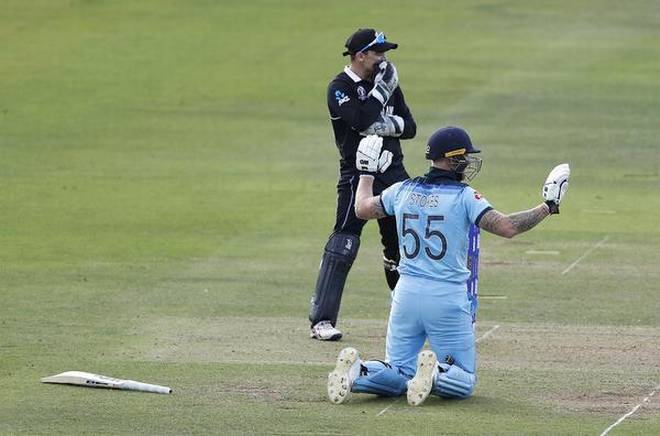London: All-rounder Ben Stokes has cleared the air regarding the controversial ‘six’ which was awarded to England during the World Cup final against New Zealand.
“I saw all of that. I was thinking to myself, did I say that? But hand on heart, I did not go up to the umpires and say something like that to the umpires,” he said in the latest episode of BBC podcast.
“I went straight to Tom Latham and said ‘Mate, I am so sorry’, looked over to Kane (Williamson) and said ‘I’m sorry’,” he added.
During the final over in England’s chase of 241 July 14 at Lord’s, Stokes accidentally knocked the ball coming in from deep midwicket fielder and deflected it off to the third man boundary, while attempting to dive for his crease with an outstretched bat in a bid to complete his second run.
After consultation with Marais Erasmus and the rest of his umpiring colleagues, Kumar Dharmasena signalled six runs for the incident, meaning that England — who by then seemed to be drifting out of contention needing nine runs from three balls — were suddenly right back in the hunt for their World Cup glory needing three more from two.
England were adjudged winners of the World Cup on the basis of their superior boundary count — 22 fours and two sixes — to New Zealand’s 17 after the the match ended in a tie after regulation play and Super Over.
Earlier, Stokes’ teammate James Anderson had claimed that the all-rounder, who was hugely apologetic the moment the incident happened, had appealed to the umpires to overturn their decision.
“I think, talking to Michael Vaughan who saw him after the game, Ben Stokes actually went to the umpires and said, ‘Can you take that four runs off. We don’t want it’,” Anderson had told BBC’s Tailenders podcast.
Dharmasena, who was targeted for his controversial overthrow call, had accepted his mistake, but said he didn’t regret the decision. ICC had also backed the Sri Lankan umpire over the issue.
Former India skipper Anil Kumble-led Cricket Committee will also be discussing issues relating to the World Cup final, including the controversial boundary count back rule, in their next meeting in first quarter of 2020.
